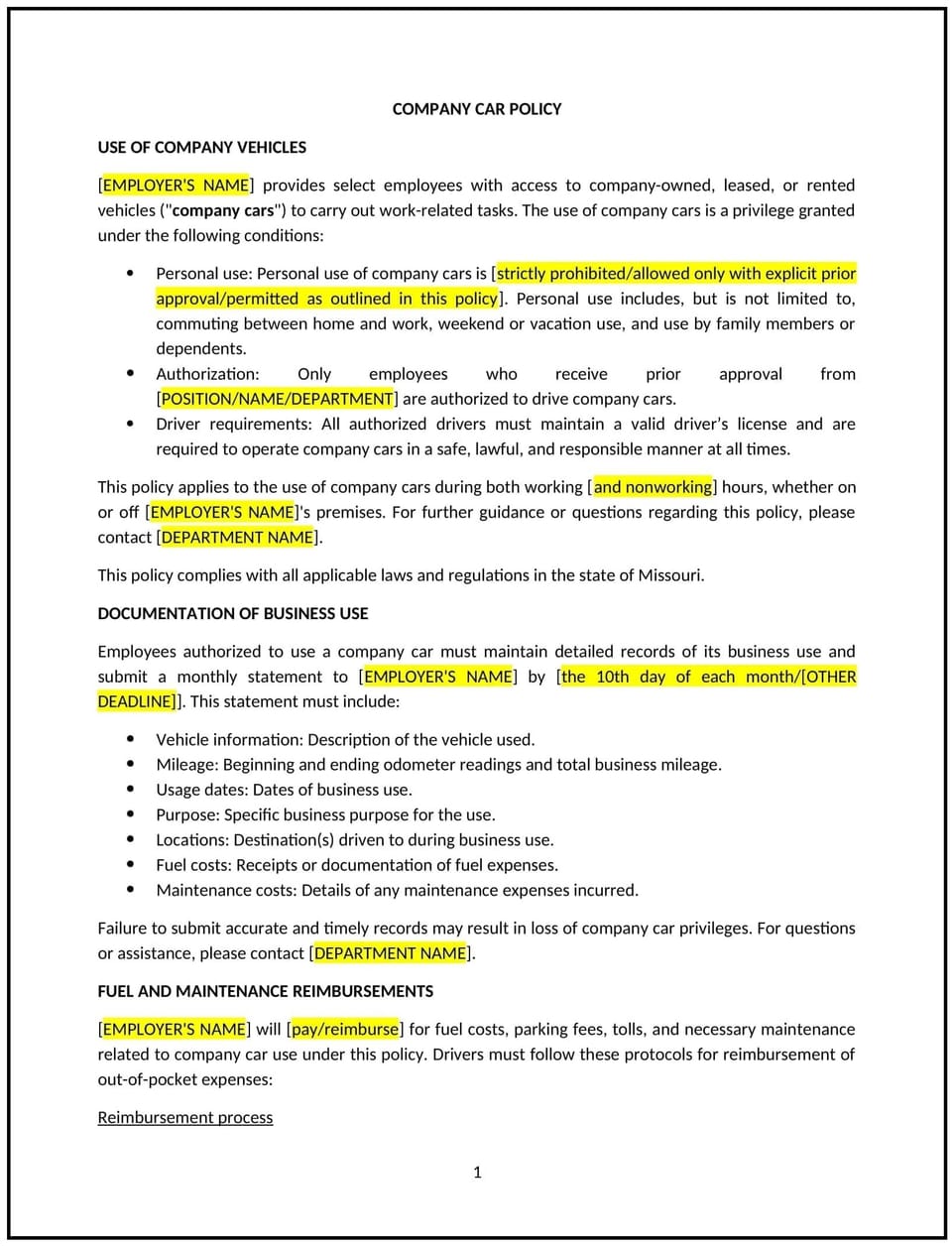Company car policy (Missouri): Free template

Company car policy (Missouri)
A company car policy helps businesses in Missouri manage the use of company vehicles for business-related purposes. This policy outlines guidelines for eligibility, usage, maintenance, and insurance, ensuring that employees understand their responsibilities when using a company vehicle. It is designed to promote safety, reduce liability, and maintain the vehicles in good working condition.
By implementing this policy, businesses in Missouri can effectively manage the use of company cars, reduce risks, and enhance operational efficiency.
How to use this company car policy (Missouri)
- Define eligibility: Specify which employees are eligible to receive a company car, based on their role, travel requirements, and length of service.
- Set usage guidelines: Clearly define acceptable uses for the company vehicle, such as commuting to and from work, business travel, or personal use, if permitted.
- Establish maintenance responsibilities: Outline the employee’s responsibilities for keeping the vehicle in good condition, including regular servicing, maintenance, and repairs.
- Clarify insurance coverage: Specify the type of insurance coverage provided by the company, including liability, collision, and comprehensive insurance, and whether employees are required to pay any premiums or deductibles.
- Define fuel and expense reimbursement: Outline whether the company will cover fuel and other operating expenses, or if employees are expected to reimburse the company for personal use.
- Address driving policies: Establish rules for safe driving, including speed limits, alcohol consumption, use of mobile phones, and other safety-related guidelines.
- Explain vehicle return process: Detail the process for returning the vehicle at the end of the employee’s use or when they leave the company, including any final inspection procedures.
- Communicate the policy: Ensure all employees are aware of the company car policy, especially those eligible for a company vehicle, and make it accessible in employee handbooks or through internal communications.
- Review regularly: Periodically review the policy to ensure it aligns with Missouri laws, business needs, and evolving company practices.
Benefits of using this company car policy (Missouri)
This policy provides several benefits for businesses in Missouri:
- Reduces liability: Clear guidelines for vehicle use and insurance help protect the company from potential legal and financial risks.
- Increases operational efficiency: Providing company cars ensures employees have reliable transportation for business-related tasks, which can improve productivity.
- Enhances employee satisfaction: Offering a company car can be a valuable perk that helps attract and retain employees, especially those who require regular travel for their roles.
- Promotes safety: A company car policy helps ensure that employees drive responsibly, reducing the risk of accidents and damage to the vehicle.
- Improves vehicle management: Clear responsibilities for maintenance and care of the vehicle can extend the lifespan of company cars and reduce maintenance costs.
- Aligns with Missouri business practices: Reflects the state’s focus on workplace safety, responsibility, and effective management of business resources.
Tips for using this company car policy (Missouri)
- Clearly communicate the policy: Make sure employees understand the company car policy, especially during onboarding or through employee handbooks, to avoid confusion and misusage.
- Set clear expectations: Define how company vehicles should be used, maintained, and returned to avoid misunderstandings.
- Monitor usage: Regularly monitor the usage of company vehicles to ensure compliance with the policy and address any misuse or issues promptly.
- Provide training: Offer training for employees who drive company cars, emphasizing safe driving practices, vehicle maintenance, and understanding the policy’s terms.
- Update the policy regularly: Ensure the policy reflects any changes in Missouri law, company procedures, or updates in vehicle maintenance practices.
- Establish accountability: Make employees aware of their responsibilities for maintaining the vehicle and using it for business-related purposes only.
Q: Why should businesses in Missouri adopt a company car policy?
A: Businesses should adopt this policy to manage the use of company vehicles responsibly, protect the company from liability, and provide employees with a clear understanding of their responsibilities.
Q: Who is eligible for a company car?
A: Businesses should define eligibility criteria, typically offering company cars to employees whose roles require regular travel or those who are in senior positions where a vehicle is deemed necessary for the job.
Q: Can employees use company cars for personal use?
A: Businesses should specify whether personal use of company cars is allowed, and under what conditions, including any reimbursement requirements or restrictions.
Q: How should company cars be maintained?
A: Businesses should outline the employee’s responsibility for maintaining the vehicle, including regular servicing, cleaning, and reporting any damage or mechanical issues.
Q: What kind of insurance is provided for company cars?
A: Businesses should specify the types of insurance provided for company cars, including liability and collision coverage, and clarify whether employees are responsible for any additional costs.
Q: What happens if an employee leaves the company or no longer needs a company car?
A: Businesses should define the process for returning the company car, including any inspection or maintenance checks that need to be conducted before the vehicle is returned.
Q: How often should businesses review the company car policy?
A: Businesses should periodically review the policy to ensure it remains relevant and up to date with changes in Missouri law, company needs, and operational requirements.
This article contains general legal information and does not contain legal advice. Cobrief is not a law firm or a substitute for an attorney or law firm. The law is complex and changes often. For legal advice, please ask a lawyer.


